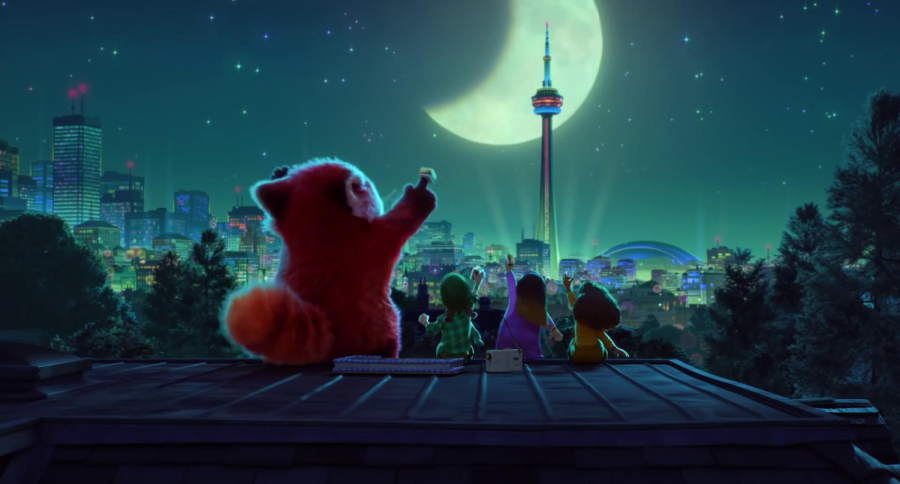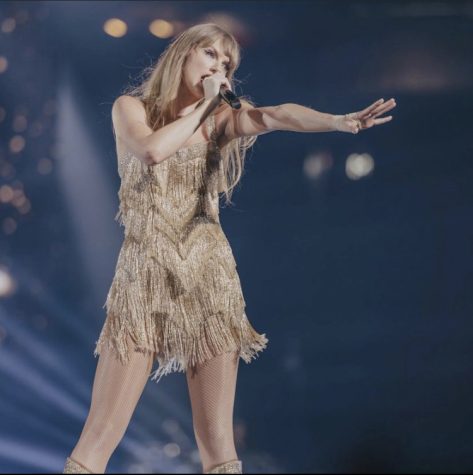“Turning Red”: Panda power reigns supreme in Pixar’s latest triumph
Domee Shi’s feature debut is one of the most irresistibly fun and delightfully colorful coming-of-age stories in recent years
March 25, 2022
As frequently as they like to tackle mature topics and themes—the existential dread of being a broken or forgotten toy, humanity’s enslavement to technology and the personification of our emotions/objectification of our memories, among other things—it seems that some people have forgotten that Pixar’s primary audience, like any billion-dollar entertainment company, is children. “Luca” was one of the animation giant’s first films in a long time where they seemed to realize that their films don’t need to be super intellectual and that sometimes it’s nice to just coast along on a breezy coming-of-age story. Even if it was a little too slight for its own good, it felt like the first step on a newer trail for future filmmakers to pick up on.
Enter Domee Shi. Shi’s journey at Pixar started in 2011 with a three-month internship, and in 2015 she served as a storyboard artist for “Inside Out,” her first work on a feature film. In the same year, Shi pitched and started developing her first directorial effort, the short film “Bao,” which premiered before “Incredibles 2” to critical acclaim and snagged an Oscar for Best Animated Short. Naturally, the next step in her career would be a feature, but “Turning Red” is unnatural in one regard instead of merely continuing on that path that “Luca” started, it blazed down it at full speed, and the result is by far their best film since the start of the pandemic and a truly unparalleled feat that I can’t see being surpassed by the studio anytime soon.
“Turning Red” follows 13-year-old Meilin Lee (Rosalie Chiang), a precocious Chinese-Canadian girl living in Toronto in 2002. At school, she and her friends Miriam, Priya and Abby hang out and crush on the hottest boy band, 4*Town; at home, however, she takes strict care of her family’s temple and works hard to make her mother Ming (Sandra Oh) proud. After getting publicly embarrassed by Ming, Mei wakes up the next day transformed into a red panda, a blessing put upon the women of the family by her ancestor Sun Yee that quickly became a curse with the modern age. As she tries to contain her emotions that control the panda’s appearance, Ming tells her that there’s a ritual that can permanently lock away the beast, but as Mei starts to embrace her new self, she must choose which path to take.
I will admit that I initially had my cards stacked against “Turning Red.” As if most of the plot wasn’t visible from miles away, the marketing made it feel like a dead-on-arrival attempt at pandering to a younger audience, but it’s clear not even five minutes into this film that Domee Shi knows exactly what she’s doing. “Turning Red” may not be terribly original, but it more than makes up for that just with its massive heart alone. Even if you’re not part of its “specific, narrow target audience,” this is a relatable coming of age story not because it panders to a young audience with trendy jokes but because it’s genuinely smart. It’s a film that continuously pokes fun at the experience of being a teenager but is never once condescending. It dives headfirst into all of the fun and embarrassing stuff that teenagers do and wears its wholly earnest heart on its sleeve, and it makes Mei’s story irresistible.
Another part of what makes it so inviting is how lovely its animation and setting are. Instead of trying to make it more modern for today’s audience or banking off of nostalgia, Shi’s early 2000s Toronto feels like a distinct, lived-in world, and it makes 4*Town’s pivotal role in the central conflict of the story that much more believable. (As well as a great cherry on top for someone who grew up in a household that listened to *NSYNC and One Direction religiously) It’s brought to life through some delightful animation that refreshingly embraces a cartoonish style instead of aiming for the detailed photorealism that so many films strive for. Its vibrant pastel color palette and springy sense of movement are stunningly expressive, and they lend a hand to the inherently comedic presence of the red panda, especially earlier on when just certain parts of the panda (its arms, ears and tail, for example) pop out of Mei. It’s when “Turning Red” eventually goes into mystical territory with its narrative that it unleashes some absolutely gorgeous visuals, and it was then that I realized that it’s probably the best-looking American animated film since “Into the Spider-Verse.”
Speaking of its narrative, “Turning Red” is just as fun to ride along with as it is to look at. It’s easy as a viewer to forecast every beat in its story, but that hardly matters since it’s the lively cast of characters that truly carry this movie. Mei and her friend group are instantly likable, of course, but the same could be said for everyone else, really. Ming nor anybody else is portrayed as a true villain—except for a school bully Tyler, but his arc is one that I definitely will not spoil; all I will say is that it’s probably the hardest I’ve laughed so far at a film this year—and it creates plenty of rich dynamics that form the central, heartwarming theme of understanding and accepting yourself. Again, it’s nothing revolutionary, but it’ll always feel nice to see a lean, 90 minute movie that knows just what to do with its short runtime.
It’s rather alarming to see Disney pull this out of a theatrical release and dump it straight onto Disney+—which is also what they’ve done with the past three Pixar films—as well as scrub the film of any LGBTQ+ representation, but it’s hard to be pessimistic about “Turning Red.” It’s a joyous inaugural venture for a confident and unique voice in Domee Shi, and despite all of the questionable controversy that’s sprung up around it on the internet, I can’t help but feel like this will go down as a modern classic for Pixar.
Overall rating: 94/100











